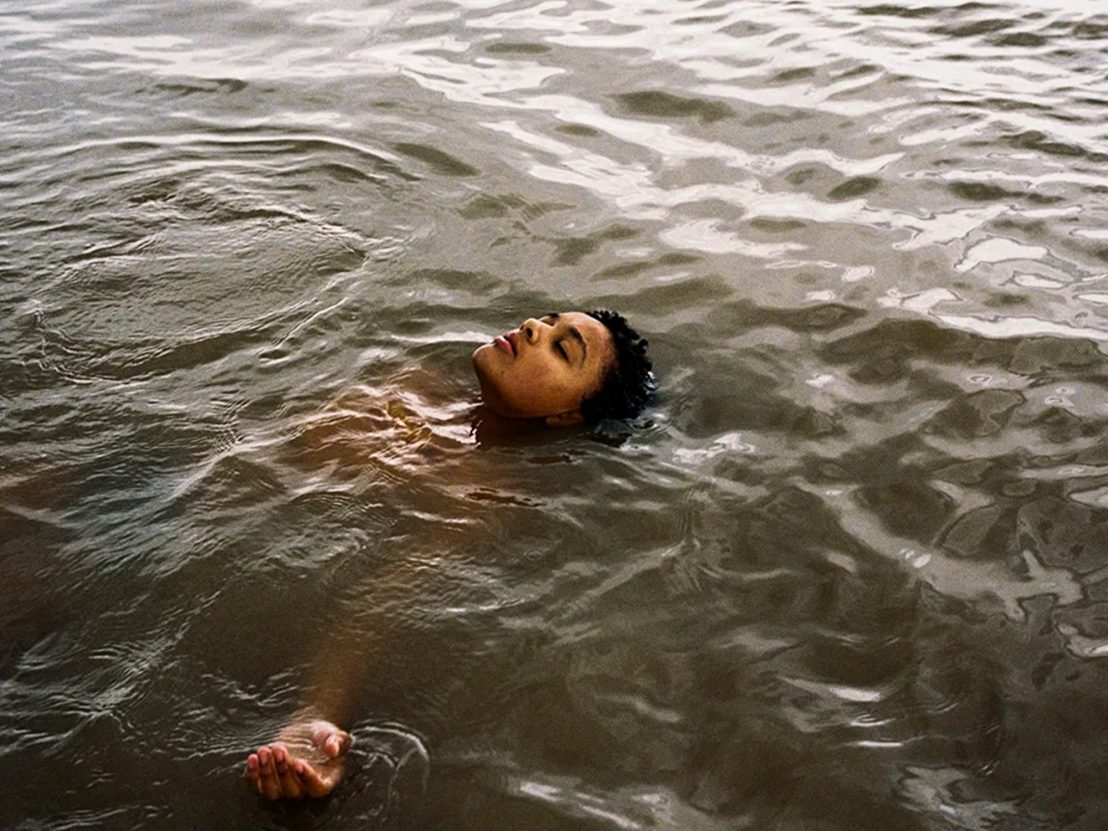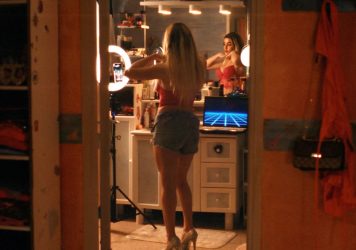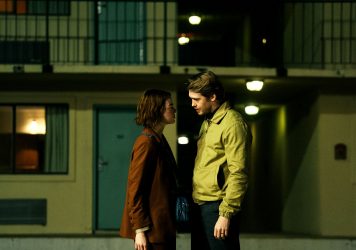
Andrea Arnold returns with a flighty kitchen sink reverie that sadly falls from grace in a muddled second half.
The social realist stylings of Andrea Arnold swerved into documentary mode for 2021’s Cow, a heartrending chronicle of a dairy cow named Luma. In name alone, Bird seems to be following the same flight path, yet it instead advances on the fictional form that Arnold first entered with Red Road and Fish Tank.
This time she sets the domestic action in the dilapidated Kent seaside town of Gravesend. Whereas in Fish Tank, its protagonist Mia sought refuge from her mum’s predatory boyfriend through dance (and QT with a local horse – the animal fixation stretches back), the 12-year-old androgynous-presenting protagonist of Bird, Bailey (first-time actor Nykika Adams), has an imagination that goes even further by bringing to life a special new friend played by none other than Franz Rogowski.
Bird (Rogowski) is a gentle, skirt-wearing drifter who appears one fine morning in the deserted meadow where Bailey has spent the night. On being told not to come any closer – Bailey pushes her camera phone forwards like a weapon – he performs a disarming dance and then skips off. In his effete vulnerability, he embodies a stark contrast to everyone else in Bailey’s life.
Her young dad Bug (Barry Keoghan) wears tattoos like a coat of armour (he has a scorpion and a spider crawling across his face and neck). Older brother, Hunter, has his girlfriend shave his hair like a “vigilante” to help him mete out gang justice to a wrong-doer in the community. Bailey’s mother, initially nowhere-to-be-found, is sought out in the second half, bringing with her a dangerous boyfriend and three scared younger siblings.
As usual, Keoghan brings an edgy charm, lighting up the world when he transports his kids through the town centre on an e-scooter while singing off-key to something being blasted out from a speaker. Still a kid himself, he cannot empathise when Bailey is reserved about him marrying a girl he has known for three months. In among their celebratory coke benders, Bailey is left to do what she will.
Bailey obsessively watches and films animals, in particular birds, and follows people to find out what they’re up to. Despite professing disinterest in Bird during the meadow meeting, she stalks him to a nearby estate and discovers that he is looking for his parents. He is her mirror image, a foreigner seeking a lost family, while she is a local whose family are no more present for being physically there.
Arnold uses the first half of the film to delicately set up threads only to weave them together using clumsy methods. In her eagerness to find the magic nestled in the grime, she leans upon contrivances. These can be illustrated by the heavy-handed way that she films graffiti in and around the quasi-squat where Bug, Bailey and Hunter live. She takes pains to film, in isolated individual shots, specific lines, whether these are inspiring (“HOPE”, “Don’t you worry”) or irreverent (“Cameron Fucks Pigs. Oink Oink”). This insistence that we pick up on messages from the setting are at odds with the shaky hand-held camera that fills in Bailey’s point-of-view. They feel like an intrusion from a director who believes that we cannot pick up on such things without a giant arrow.
This minor quibble becomes more jarring in a scene where Bailey visits her estranged mother, Peyton, found languishing in bed with a menacing midlander named Skate. The purpose of this house call is to find out if Peyton knows where Bird’s parents are, and Bird is also present. This exchange is interrupted by Bailey’s young sister, Peena, arriving with a cup of tea that is not to Skate’s satisfaction. As he begins to kick off, Peyton begins to remember where Bird’s dad is.
The scene is scripted so that these two lines of pursuit unfold in a rhythm. It just doesn’t work. Skate is a terrifying man, and Peyton’s reverie – as a woman whose antennae would clock every shift in his mood – does not seem believable. From this point onwards, the storytelling gears shift too audibly and the dialogue that attempts to bridge the gap feels clunky and on-the-nose.
Arnold has form in casting established actors opposite first-timers and it can work very well – as the predatory boyfriend in Fish Tank, Michael Fassbender’s smoothness added a layer to his character’s power. However, here, Rogowski’s gift for nuance renders his scene-partner, Adams, oblique and distant. Bird’s wings are clipped by Arnold’s inability to marry fantastical storytelling with grounded concerns.
Published 16 May 2024

A young woman with her heart set on social media stardom gets a shot at fame when she's offered an audition for a reality series in Agathe Riedinger's feature debut.

Yorgos Lanthimos, David Cronenberg and Francis Ford Coppola roll out for France's premiere film jamboree.